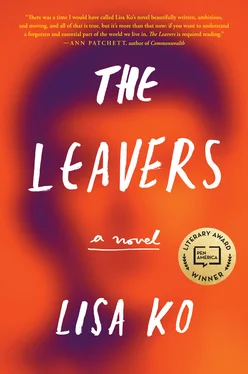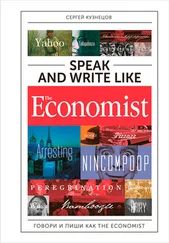Vivian and Leon exchanged a look. Mortified at how you refused to obey me, I ladled out the soup Vivian and I had made. You and Michael balanced your bowls on your laps. “Thank you,” Michael said, looking at Vivian and then at me, as if he was waiting for permission to eat. His eyes were large and watery, and I realized he was afraid of me.
DIDI AND I WERE in the alley behind Hello Gorgeous, splitting a cigarette on our break. A pigeon circled the trash cans.
“I’ve been leaving hints for Quan,” she said. “The other day, I showed him a picture of an engagement ring in a magazine.”
“What did he say?”
“He just nodded.” She shook her head. “Do you think I’m wasting my time?”
I didn’t mention that Leon had suggested marriage. “If he doesn’t want to marry you, then he’s a fool,” I told her. “You could find a better man, someone who will.”
Her face relaxed. “I know. And you could, too, Polly.”
I did know that, though I didn’t tell Didi how I daydreamed about men with money and papers. I’d hear our neighbor Tommie talking about visiting family in the Dominican Republic and wished I could travel like that. Living with Leon and Vivian, I found myself slipping back into a village accent, but envied how easily they could talk to one another, how Vivian bought Michael books and DVDs when she made even less than I did, and I worried I would never get better at English and you would grow up to be a meat cutter. There were other cities out there with other opportunities. Riding the bus downtown, I’d think: I could keep riding. I could never get off .
“Ignore Vivian,” Didi said. “Ignore Leon’s nonsense. Act like a woman who likes to eat dried squid out of the bag for dinner. The world’s not made of magic.”
“I like dried squid,” I said, passing the cigarette to Didi.
“All right, squid breath.”
“And I never said the world was made of magic.”
“It’s an expression.”
“I’ve never heard that expression before.”
Didi passed the cigarette back, green eye shadow glimmering. “That’s because I made it up. Don’t worry so much, okay? Either stay with Leon or move on.”
“You, too,” I told her. “Don’t worry so much.”
I linked my arm in Didi’s. It was good to have a friend.
VIVIAN WAS THE OLDEST of Leon’s three siblings. “She was the first to come to America,” Leon said, “then she married that cocksucker who ran off on her. Had another woman on the side. Now she needs us to help pay the rent. But inside she’s a soft woman, like you.”
“I’m not a soft woman.” Then I wondered if Leon had asked me to move in with him only to help Vivian with the rent.
“Yes, you are.” He rubbed the knobs at the top of my spine. “Your boobs are soft. Your ass.” I grabbed his waist and he pushed me onto the bed, kissing my neck, my earlobes, my shoulders.
He bought me gifts, an itchy yellow sweater covered in yarn balls that resembled pimples, a stuffed unicorn, a plastic kitten to hang from the antenna of my cell phone. When he presented them to me the hopeful look on his face reminded me of you, gifting me pictures you’d drawn at school, lopsided scratches in jiggly colors. I kissed and thanked him. Leon bought gifts for you, too, a softball, a big leather mitt for catching. The three of us walked to the park on a summer Saturday, and I watched him throw you the ball. When you missed, he was encouraging. “Good try!” Then he’d toss it again. When you caught it the two of you would leap up and down, like you had won an Olympic medal. Leon let you high-five him again and again.
“Come play, Mama,” you shouted.
“Polly, join us,” Leon said.
I got up and watched, my son and my man, your comfort with one another, your laughter. All that I had once wanted, this big life, my exciting life, seeing the places in Liling’s old textbook, the promises I had made to myself when I called the lady with the mustache, were in danger of drying up. Or had they been a young girl’s fantasies? I walked with Qing and Xuan outside the factory. I stepped into the Atlantic Ocean and decided to have a baby. Maybe it wasn’t about moving to new places, but about the challenge of staying put.
Leon tossed the ball. You caught it and lobbed it back. How did I get here? A flock of birds flapped over the trees, but the sun was shining so hard, it hurt to see.
SECOND GRADE TURNED INTO third grade, third grade into fourth, and your English grew from timid to fluent, you and Michael learning how to keep secrets from Vivian and me. At P.S. 33, the kids were Cambodian, Mexican, Filipino, Jamaican, Puerto Rican, Vietnamese, Guyanese, Dominican, Haitian, Ecuadorian. They were all from other places, or at least their parents were.
Michael was skinny on the bottom but wider up top, shaped like a bobble-headed toy, with an array of similarly undersized friends who also became your friends, Hung and Sopheap and Elroy. The year you were in fourth grade, you and Michael talked about something called Power Rangers as if they were actual people in the neighborhood.
“Who is this Timmy? A kid from school?”
You and Michael writhed on the couch, slapping your thighs, clapping your hands. “Tommy, not Timmy! He’s not a kid . He’s the Black Dino Ranger.”
“Black. die?”
“What?” Vivian said. “Who’s dying?”
You and Michael shrieked. “ Dino, not die ! Dino, dino, dino!”
When I watched you and Michael play catch in the park, I was proud because you could throw the ball harder, faster. Still, while you were stronger and more fearless, Michael was the A-student, and you were bad at school, like I’d been — I could memorize lyrics to pop songs and figure out the precise mix of colors to make a certain shade, but never the multiplication table — and neither Leon nor Vivian were scholars, which made Michael’s grades a fluke, random enough it might as well be you who was the good student, you the one who said things like “when I go to college.” I knew it was unfair to compare you two when Michael had never lived anywhere except New York, but when he chose to read a library book as you sat in front of the television — and yes, I was likely right there next to you — watching a rerun of a rerun you’d already seen four times, claiming to have lost your homework yet again, I felt exposed for my own lack of interest in books, unless they were the books on art and painting Coco brought to the salon; those I liked to read. You’d been slow to learn English. Your sweat had a cabbage-y odor that I was convinced was Haifeng’s genetic bequest. You always took the biggest piece of candy, gorging yourself before others took a bite, banged chicken wings on your plate and pretended you were playing the drums. Chunky and padded from the food you ate, your shirts rode up around your waist, and you teetered on fat, outgrowing new pants overnight. As if I had money to buy new clothes all the time! I worried it was my fault when you acted impolite or selfish, that it reflected a deficiency in myself.
Hana had left Hello Gorgeous to run a dry cleaning business with her husband and brother, but I remembered how her two children were going to high schools in the city, ones they had to pass a test to get into.
“You’re too hard on him,” Leon said. “He’s not doing so bad.”
I had been in New York for ten years and often reminisced about those early months on Rutgers Street, a time so desultory I would wake up in my sleeping bag each morning startled by where I was and what I had done. Back then, the passing of each day had felt inconsolable, as if there would be no end to the uncertainty — the baby, the job, the debt — but I revisited that first year in New York more than any other time in my history, loved to flip it around, marveling at my youth, how scary and exciting it had been, how so much had changed since then. Even the time I took you to the factory seemed safe enough to remember, though I always backed off when I pictured what things would have been like if I hadn’t returned to the bench where I had left you.
Читать дальше











